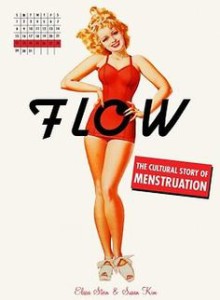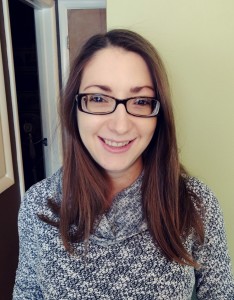“This may sound strange, but because of endometriosis, I have a lot to be thankful for.”
Guest Post by Sophie Zivku, MA, Communications and Education Manager, Diva International Inc.
If you asked me ten years ago where I saw myself in my 30s, I never would have said working for a menstrual cup company and being known in my social circle as the expert on all things period. But, here I am, at 32, working for Diva International Inc. (makers of The DivaCup), writing about menstruation.
I wasn’t always as passionate about the menstrual cycle as I am today. In fact, I despised my period. If my body could stomach the Pill, I’d probably still be taking it continuously without regret.
So what changed?
It was summer 2010 and I was taking the season to rest before starting a year-long journey of graduate studies. I spent my afternoons basking in the sun on my front porch, reading whatever I could.
One afternoon I came across a book review for Elissa Stein and Susan Kim’s, Flow: The Cultural Story of Menstruation. “Interesting,” I thought, “An entire book about periods—an entire book about something that has ruled my life since I was 12.”
At this point in my life, I didn’t have many answers to the reason why my period was so awful. I had seen doctor after doctor, without much help or support. Perhaps Flow had something more to offer?
I had to read it.
 By the second sentence I was hooked, intrigued, and obsessed with anything to do with menstruation. With every page turn I felt as if I was empowering myself with the knowledge and tools I needed to finally combat my awful period symptoms. I checked out stacks of books from various libraries and began researching online; I couldn’t get enough!
By the second sentence I was hooked, intrigued, and obsessed with anything to do with menstruation. With every page turn I felt as if I was empowering myself with the knowledge and tools I needed to finally combat my awful period symptoms. I checked out stacks of books from various libraries and began researching online; I couldn’t get enough!
I didn’t plan on writing my Major Research Paper on the discourse of menstruation in feminine hygiene advertising, but once I caught a glimpse into its history, I knew I had to, if anything for myself. Flow helped me to better understand why there weren’t many answers to the questions I had about my menstrual health. It helped me understand why the medical field didn’t take menstruation seriously and it encouraged me not to accept it as so.
As a writer and researcher I truly believe that the best way to overcome something is to research the topic until you feel you know more about it, then it does about you. It was time for me to take my period experience back.
While working on my Major Research Paper, I started seeing a counselor. I had a lot of anger towards my uterus. She encouraged me to write about it and so began my personal blog, dropsofscarlet. Dropsofscarlet was not only a forum for me to vent my frustration about my period, but also a forum for me to share my research findings and random musings about the menstrual cycle.
After graduation, I joined the team at Diva International Inc. and since then have learned much about myself, the feminine hygiene industry, and a disease I’ve lived with for years— endometriosis. A year after starting my much-loved career, I underwent laparoscopy surgery which confirmed the doctor’s suggested diagnosis of endometriosis. Sadly, my doctor at the time refused to remove the excess growth as he believed: “It would just grow back in two years.”
Unfortunately for him, I knew better. After much research, I got a second referral, and then a third and then finally a second surgery which revealed stage four bilateral endometriosis. My surgeon removed as much of the excess growth as he could, cleaned out my left ovary (which was filling with endometrial tissue) and repaired my uterine septum. Recovery was less than pleasant. My first cycle after surgery, I emptied The DivaCup every 40 minutes, after soaking through an overnight pad.
Most people don’t know much about endometriosis and if they do, they simply think it means a woman has bad period cramps. While cramps can be one symptom, nausea, vomiting, excess bloating, heavy flow, painful ovulation, pelvic pain, infertility, immune dysfunction, painful sex and mood changes are just a few of the symptoms women can experience. I often tell people that endometriosis is a menstrual cycle disease. This means that the disease is experienced on a similar cycle as the menstrual cycle (28-35 days; essentially, every day). While there is no known cure, doctors often prescribe some form of birth control to manage the symptoms, along with pain medication.
These are temporary solutions.
Because of the reach and virality of social media, endometriosis is becoming better known. Celebrities like Padma Lakshmi and Lena Dunham are sharing their stories and thanks to the work of various organizations like the Endometriosis Foundation of America, Endometriosis Network Canada, and Endometriosis UK (to name a few), more women are receiving the care they deserve at a much younger age. And because of my job I’ve had the privilege to secure partnership between Diva International Inc. and the Feinstein Institute for Medical Research and their important study: Research OutSmarts Endometriosis (ROSE Study). This five-year study is seeking to understand the genetic basis of the disease through collection of menstrual flow using The DivaCup. The study aims to provide women with improved diagnostics and treatments and to date the study is well on its way to achieving its research goals.
This may sound strange, but because of endometriosis, I have a lot to be thankful for. If it weren’t for the disease, I wouldn’t have had the drive to write about menstruation for my MRP, dropsofscarlet would cease to exist and I probably would not have applied for a job at Diva International Inc. I would have never discovered the many, many benefits of pelvic health physiotherapy, the calm that comes with yoga practice or how much better I feel following an anti-inflammatory diet.
Living with endometriosis has taught me a lot about what it means to feel pain—a pain that is invisible to everyone around you. I’ve felt sorry myself, cried a lot, gotten angry and suffered a miscarriage. Living with endometriosis is challenging. It is challenging to explain, challenging for others to understand, challenging to accept. I don’t have all the answers, but I’m too stubborn to accept the disease as it is.
And so I will continue to research and write and hope for a medical miracle.
When she is not writing and researching about the menstrual cycle and woman’s health for Diva International Inc., you will find Sophie Zivku trying out new recipes, reading, attempting to knit and spending time with her ever-growing family in Ontario, Canada.


